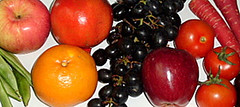 Image by nutrilover via FlickrThe truth is that you can easily learn enough to be growing useful vegetable crops very quickly, and each session spent in your garden teaches you even more. You will learn much that is unique to your own situation, such as local soil conditions, your particular aspect in relation to the sun, and oddities that relate to your local microclimate. You will learn most of this simply by getting involved and doing it - always the best way to learn!
Image by nutrilover via FlickrThe truth is that you can easily learn enough to be growing useful vegetable crops very quickly, and each session spent in your garden teaches you even more. You will learn much that is unique to your own situation, such as local soil conditions, your particular aspect in relation to the sun, and oddities that relate to your local microclimate. You will learn most of this simply by getting involved and doing it - always the best way to learn!The taste of home grown vegetables is vastly superior to that of the commercially grown produce. Have you heard people complain that tomatoes no longer have any taste? They will have when you grow your own – you will never taste better. The lack of taste with the commercial crop is not all the fault of the growers, as they are under pressure to produce a crop of uniform size and color, that are durable enough to be shipped long distances, to the schedule of the wholesale market and ultimately the supermarket.
But you set your own schedule. The freshness of your own crop is a big plus. Vegetables I have bought from the supermarket, and stored in the refrigerator, have started to become inedible after a few days. I have had home grown produce still fresh in the refrigerator after 2 weeks! This is due to the fact that the stuff you buy in the supermarket (depending on what it is), can be several days to several weeks old already.
Typically, an effectively maintained and efficiently planted home garden will produce a generous yield, and can readily help pay for the cost of growing them. You can effectively end up having free vegetables. Summer, especially, is usually a time of abundance, even glut, as family and friends leave your place with perhaps more produce than they had expected to see.
A tip – when giving away fresh produce, try to limit your generosity – it is better to give a small amount to many rather than to give to the few more than they can actually use.
 Image via WikipediaOne of the turn-offs to trying something you have not done before is the intimidating flood of information (and misinformation) you will receive. If you are browsing one of the major bookstores, you may find hundreds of books on the topic – which do you buy? To begin with, look for the simple, basic information. Do not bother with those full of jargon – you will learn the technical terms as you go. (And of course, visit this blog often, as we have loads of jargon-free sustainable gardening articles here!)
Image via WikipediaOne of the turn-offs to trying something you have not done before is the intimidating flood of information (and misinformation) you will receive. If you are browsing one of the major bookstores, you may find hundreds of books on the topic – which do you buy? To begin with, look for the simple, basic information. Do not bother with those full of jargon – you will learn the technical terms as you go. (And of course, visit this blog often, as we have loads of jargon-free sustainable gardening articles here!)You will hear folklore from the family, such as “Uncle Henry always put ... (you name it) ... on his ... (name it again)”. Folklore is part of our heritage, but there is no guarantee of its usefulness.
You may even hear from the office genius, who has never gardened in his life, but still knows all the answers - just nod wisely, and then ignore him.
Gardening is much easier than you might gather from all this information that seems to sometimes fly at you. Plants evolved millions of years before humans, and they actually want to grow. It has been said that in many cases plants grow despite what we do to help them. If you provide the basics, and these are reasonable nutrition and regular watering, Mother Nature does the rest – let her work for you.
Gardening Books for Beginners:

No comments:
Post a Comment